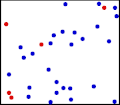File:Translational motion.gif
Appearance
Translational_motion.gif (300 × 263 pixels, file size: 398 KB, MIME type: image/gif, looped, 370 frames, 19 s)
| This is a featured picture, which means that members of the community have identified it as one of the finest images on the English Wikipedia, adding significantly to its accompanying article. If you have a different image of similar quality, be sure to upload it using the proper free license tag, add it to a relevant article, and nominate it. |
| This image was selected as picture of the day on the English Wikipedia for May 14, 2007. |
File history
Click on a date/time to view the file as it appeared at that time.
| Date/Time | Thumbnail | Dimensions | User | Comment | |
|---|---|---|---|---|---|
| current | 03:31, 28 March 2008 |  | 300 × 263 (398 KB) | Greg A L | |
| 18:44, 30 October 2006 |  | 300 × 263 (398 KB) | EdC | {{Information |Description=thermal motion of gas molecules |Source=English wikipedia |Date=August 25th 2006 |Author=A.Greg, en:user:User:Greg L |Permission= |other_versions= }} |
File usage
The following 40 pages use this file:
- Chemosynthesis (nanotechnology)
- Diffusion
- Elastic collision
- Equipartition theorem
- H-theorem
- Kinetic theory of gases
- Neutron moderator
- Temperature
- Thermodynamic temperature
- User:Dhatfield/Illustrators
- User:Greg L
- User:Nbaraz/sandbox
- User:Passargea/Favourite pictures/Animations
- User:Sanjay517
- User:Sentriclecub/change in Enthalpy aka Heat of Reaction
- User:Support.and.Defend/chain rule
- User:Tunakdude/Tunakdude
- User:АБВГ
- User talk:Greg L
- User talk:Greg L/Archive 1
- User talk:Jimbo Wales/Archive 56
- Wikipedia:Featured picture candidates/January-2007
- Wikipedia:Featured picture candidates/Translational Motion
- Wikipedia:Featured picture candidates/delist/2007
- Wikipedia:Featured picture candidates/delist/Translational Motion
- Wikipedia:Featured pictures/Sciences/Others
- Wikipedia:Featured pictures thumbs/07
- Wikipedia:Reference desk/Archives/Science/2008 November 6
- Wikipedia:Reference desk/Archives/Science/2012 June 8
- Wikipedia:Today's featured picture (animation)/May 14, 2007
- Wikipedia:Village pump (proposals)/Archive AK
- Wikipedia:WikiProject Physics
- Wikipedia:WikiProject Physics/Recognized content
- Wikipedia:Wikipedia Signpost/2007-01-29/Features and admins
- Wikipedia:Wikipedia Signpost/2007-01-29/SPV
- Wikipedia:Wikipedia Signpost/Single/2007-01-29
- Template:POTD/2007-05-14
- Portal:Physics/2007 Selected pictures
- Portal:Physics/Selected picture/July 2007
- Portal:Science
Global file usage
The following other wikis use this file:
- Usage on af.wikipedia.org
- Usage on am.wikipedia.org
- Usage on an.wikipedia.org
- Usage on ar.wikipedia.org
- ديناميكا حرارية
- درجة حرارة
- نظرية التصادم
- طاقة حرارية
- توزيع بولتزمان
- نظرية حركية للغازات
- طاقة داخلية
- تصادم مرن
- قوانين الغازات
- درجة حرارة مطلقة
- مهدئ النيوترون
- إنتروبيا وسهم الزمن
- الفيزياء الإحصائية
- غاز
- أحادي الذرة
- بوابة:الرسوميات الحاسوبية/صور مختارة
- بوابة:كيمياء فيزيائية
- بوابة:كيمياء فيزيائية/صور مختارة
- بوابة:كيمياء فيزيائية/صور مختارة/2
- Usage on ast.wikipedia.org
- Usage on az.wikipedia.org
- Usage on be-tarask.wikipedia.org
- Usage on be.wikipedia.org
- Usage on bg.wikipedia.org
- Usage on bn.wikipedia.org
- Usage on bs.wikipedia.org
- Usage on ca.wikipedia.org
View more global usage of this file.


